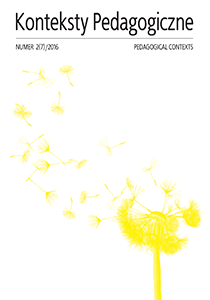Abstract
The present article aims to present a short overview of recent studies researching the use of Tomatis auditory stimulation while addressing various types of learning difficulties like difficulties in reading, communication or behavior among primary school students. The results of the presented studies clearly show positive influence of the auditory stimulation on mentioned before skills. It was shown that Tomatis method seemed to improve significantly students’ learning outcomes as well as, in some cases, behavior and could be used to aid students with different kinds of learning difficulties..
References
Gilmor T., The efficacy of the Tomatis Method for children with learning and communi-cation disorders: A Meta-Analysis, “International Journal of Listening” 1999, 13, 1.
Kurkowski Z.M.,Tomatis method applied in the diagnosis and speech therapy,“Logopedia” 2013, 42.
Metoda Tomatisa. Publikacja końcowa projektu „Uwaga! Sposób na sukces”, red. J. Ratyńska, Gdańsk 2013.
Mularzuk M., Skuteczność terapii Tomatisa u dzieci ze specjalnymi potrzebami nauczania na podstawie wyników badań własnych, [w:] Metoda Tomatisa. Publikacja końcowa projektu „Uwaga! Sposób na sukces”, red. J. Ratyńska, Gdańsk 2013.
Ratyńska J., „Uwaga! Sposób na sukces”. Słuchanie a słyszenie. Czym jest Metoda Tomatisa. Doświadczenia międzynarodowe (materiały konferencyjne).
Ross-Swain D.,The Effects of The Tomatis Method of Auditory Stimulation on Auditory Processing Disorder: A Summary of Findings,“International Journal of Listening” 2007, vol. 21, no. 2.
Sandislands M., The Tomatis Listening Training Program: A Quasi-Experimental Field Evaluation, “International Journal of Special Education” 1989.
Sollier P., Listening for Wellness – An Introduction to the Tomatis Method, Hong Kong 2005.
Thompson B., Andrews S.C., An Historical Commentary of Physiological Effects of Music: Tomatis, Mozart and Neuropsychology, “Integrative Physiological and Behavioral Sci-ence” 2000, vol. 35, 3.
Tomatis A.A., The Conscious Ear, New York 1991.
Tomatis A.A., The Ear and the Language, Ontario 1996.
In accordance with the recommendation of the Ministry of Science and Higher Education, which aims to counteract the practice of “ghostwriting” and “guest authorship,” all authors submitting their text for publication should attach an author’s statement which declares the contribution of each of the authors to the article. The printed and signed statement should be delivered by mail or other means to editor-in-chief Joanna Skibska or sent in the form of a scan to the following e-mail address: redakcja@kontekstypedagogczne.pl. The authors will not receive remuneration for publishing their papers. The editors reserve the right to make minor editorial changes to the articles which will not affect the substance of the article. We encourage all authors to prepare their articles in accordance with the guidelines for manuscript preparation. Download pdf file.
Authors transfer all copyrights and grant the journal the right of first publication with the work simultaneously licensed under a Creative Commons Attribution License that allows others to share the work with acknowledgement of the work's authorship and initial publication in this journal. All authors agree to the publishing of their email addresses, affiliations and short bio statements with their articles during the submission process.

